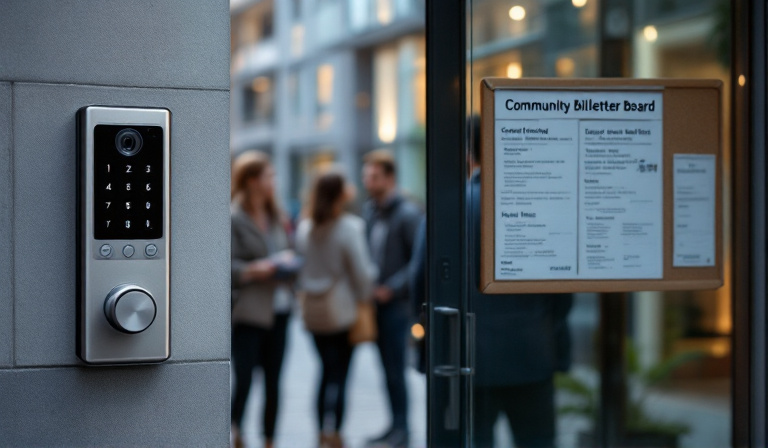
When it comes to renting an apartment, one of the top priorities for any renter should be security. Feeling safe and secure in your living space is crucial, not only for your peace of mind but also for the protection of your belongings. While renters may not have control over certain aspects of their building's security, there are many practical steps you can take to enhance the safety of your apartment. Here, we explore various strategies and tips to help renters boost their apartment security.
Understanding Your Lease and Building's Security Features
Before implementing any security measures, it's essential to understand the security features already in place and any restrictions that may be outlined in your lease agreement. Some buildings may have specific rules about installing additional locks or security systems. Here are a few steps to take:
- Review Your Lease: Check your lease for any clauses related to security and what is permitted. Some leases may require landlord approval for modifications.
- Discuss with Your Landlord: Have a conversation with your landlord or property manager about existing security measures and any potential improvements.
- Identify Building Security Features: Take note of features like security cameras, entry systems, and lighting in common areas.
Securing Your Apartment Doors
Your apartment doors are the primary entry points and should be fortified to prevent unauthorized access. Here are some suggestions:
- Install a Deadbolt Lock: Ensure that your door has a sturdy deadbolt lock. If not, request permission to install one, as it adds an extra layer of protection.
- Add a Strike Plate: Reinforcing your door's strike plate with longer screws can make it more resistant to forced entry.
- Use a Door Security Bar: A security bar can be placed at the base of the door to prevent it from being opened from the outside.
- Consider a Peephole: If your door doesn't have a peephole, consider installing one to see who is outside before opening the door.
Windows: A Vulnerable Point
Windows can be a weak spot in apartment security, especially if they are on the ground floor or easily accessible from the outside. Here are ways to secure them:
- Install Window Locks: Ensure all windows have locks, and use them consistently.
- Use Window Sensors: Consider installing window sensors that alert you if a window is opened unexpectedly.
- Apply Security Film: Security film can be applied to windows to prevent them from shattering easily.
- Use Curtains or Blinds: Keep curtains or blinds closed when you're not home to prevent outsiders from seeing in.
Lighting: Illuminating Safety
Proper lighting can deter potential intruders and increase visibility. Here are some lighting tips:
- Install Motion Sensor Lights: Place motion-sensor lights near entryways and windows to startle intruders.
- Use Smart Bulbs: Smart bulbs can be controlled remotely, allowing you to turn lights on or off even when you're not home.
- Ensure Outdoor Lighting: If your building allows, add outdoor lighting to poorly lit areas around your apartment.
Investing in Technology
Technology has made it easier than ever to monitor and secure your apartment. Consider the following technological solutions:
- Smart Doorbells: These devices allow you to see and speak with visitors remotely, adding an extra layer of security.
- Security Cameras: Install security cameras inside your apartment to monitor activity. Some cameras offer live streaming and motion detection alerts.
- Alarm Systems: Consider a wireless alarm system that can be easily installed and moved if you change apartments.
- Home Automation: Integrate security devices with a home automation system for centralized control via smartphone.
Building a Community Watch
Creating a sense of community with your neighbors can significantly enhance security. Here's how to build a community watch:
- Get to Know Your Neighbors: Introduce yourself and exchange contact information for emergencies.
- Organize Meetings: Arrange regular meetings to discuss security concerns and strategies.
- Share Information: Keep each other informed about suspicious activities or new security measures.
Practicing Everyday Security Habits
The simplest habits can have a significant impact on your apartment's security. Keep these routine practices in mind:
- Always Lock Doors and Windows: Ensure that all entry points are locked when you leave or go to sleep.
- Be Mindful of Strangers: Do not let strangers into the building or your apartment without verification.
- Secure Valuables: Keep valuable items out of sight and consider using a safe for important documents.
- Change Locks if Necessary: If you've lost your keys or moved into a previously occupied apartment, consider changing the locks.
Conclusion
Enhancing your apartment security doesn't have to be an overwhelming task. By taking a proactive approach and implementing practical measures, you can significantly improve the safety of your living environment. Whether it's installing additional locks, utilizing technology, or fostering a cooperative community, these strategies can help ensure that you feel secure in your rental home. Remember, a secure apartment isn't just about the physical barriers; it's about cultivating habits and awareness that contribute to a safer living space.

